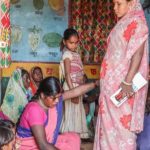Are data available for tracking progress on nutrition policies and programs in South Asia?
The World Health Organization (WHO) and other global nutrition and health agencies recommend nutrition actions throughout the life-course to address malnutrition in all its forms. As global recommendations are updated based on available evidence, it is anticipated that governments and stakeholders will, in turn, build on these recommendations to update national policies and programs. Little is known in the South Asia region about policy coherence with globally recommended actions. Even less is known about the degree to which countries are able to track their progress on nutrition actions.
The International Food Policy Research Institute’s (IFPRI) South Asia Office, in collaboration with the UNICEF Regional Office for South Asia (ROSA) and others, examined the alignment of national nutrition policies and programs with global recommendations, and assessed the availability of data to track progress on nutrition actions across the eight South Asian countries.
To address the gap, a regional brief and accompanying country reports summarize the policy and program gaps in addressing nutrition actions, along with data gaps in population-based surveys in all the countries in the South Asia region, including Afghanistan, Bangladesh, Bhutan, India, Maldives, Nepal, Pakistan, and Sri Lanka.
Read more on this work in our latest blog post here.
Download the regional brief here and the report on India here.
Please find the reports on remaining South Asian countries here.
This content was originally published in the Data for Decisions to Expand Nutrition Transformation (DataDENT) website here.


